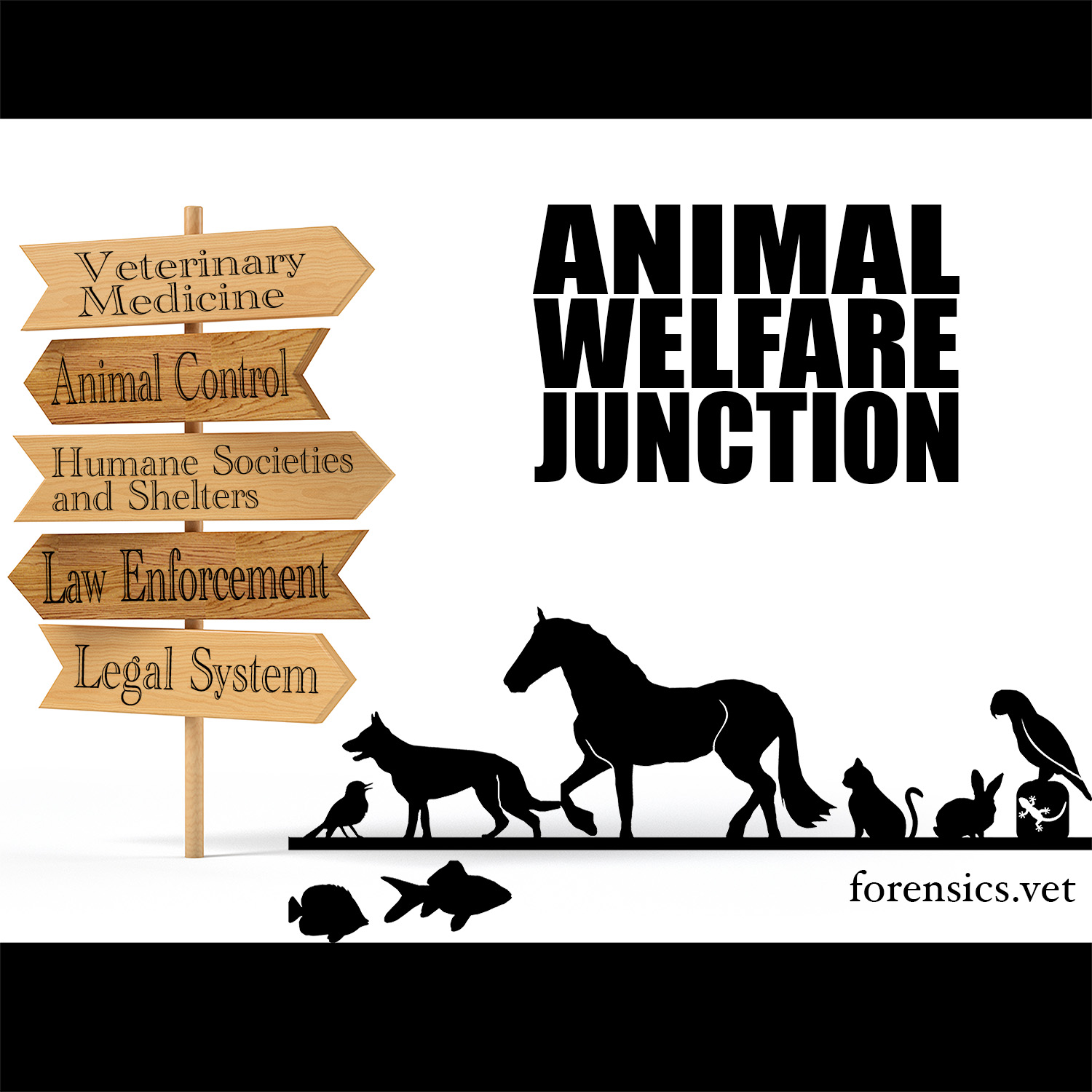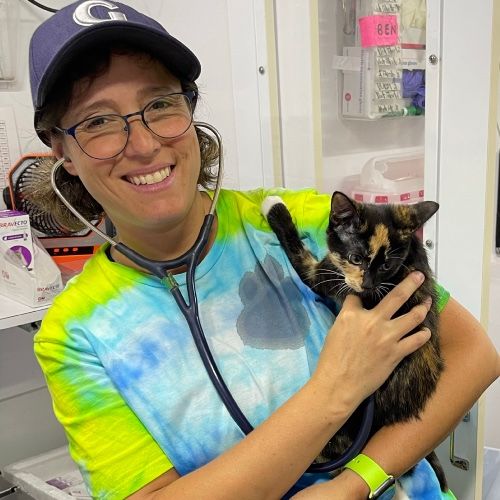UF Animal Forensics Conference 2024: Best Practices in Animal Cruelty Investigations with Amber Wallyn
We are in person at the 2024 Animal Forensic Conference in Gainesville, Florida! Dr. G will be interviewing several of the speakers to give our audience a bit of the knowledge gained through the presentations. We will be releasing each interview individually to allow our listeners to find topics of interest.
This episode is the first interview of the conference, and we have Amber Wallyn, Animal Cruelty Investigator in Lake County, Florida. She will discuss best practices in an animal crimes investigation to build a strong case. This episode is valuable to all individuals involved in the case, from veterinarians to ACOs and law enforcement.
We would also like to invite our listeners involved in animal cruelty
investigations to visit and join the International Society for Animal Forensic
Sciences https://isafs.org/
Mentioned in this episode:
Keep it Humane Podcast Network
The Animal Welfare Junction is part of the Keep It Humane Podcast Network. Visit keepithumane.com/podcastnetwork to find us and our amazing animal welfare podcast partners.
Transcript
All right, so our first presenter of the day is Amber Wallyn.
2
:Thank you for joining us at the junction.
3
:Amber Wallyn: Thank you.
4
:DrG: Can you start by telling us about
your background and how it relates
5
:to the field of veterinary forensics?
6
:Amber Wallyn: So my background
has always been in animal
7
:enforcement with animal laws.
8
:Um, I've been doing animal cruelty
investigations for the last 16 years.
9
:And like I said in the, in the speech,
it's, it's progressed from that
10
:paper, pen and paper to computers.
11
:So.
12
:That's my background.
13
:DrG: And you are located here in Florida?
14
:Amber Wallyn: I am.
15
:I'm in Lake County.
16
:DrG: Excellent.
17
:So what was the topic of your talk today?
18
:Amber Wallyn: It was Best Practices
for Animal Cruelty Investigations.
19
:DrG: How would you describe your role
as an animal control investigator
20
:during an animal cruelty investigation?
21
:Amber Wallyn: Right, so usually, um, we'll
have officers or law enforcement first
22
:arrive on scene and then they'll call me
out, um, once they know that they have an
23
:actual case, whether it's criminal, civil,
whatever it is, um, and from that point
24
:on we investigate it from the start to the
finish, um, and work with other agencies.
25
:DrG: So I wanted to discuss
that because you brought up a
26
:big point about collaboration.
27
:What is the importance of collaboration
and how it helps you during these cases?
28
:Amber Wallyn: You have
to have collaboration.
29
:Like I said earlier, it, it,
I know what I'm talking about.
30
:Veterinarians, they proof that
we know what we're talking about.
31
:Um, they're the experts in their
field when it comes to forensic
32
:or even just the animal itself
and doing well being checks to law
33
:enforcement, to legal professionals.
34
:If you don't have the legal professionals
on board with you, it's extremely hard
35
:to make it through to prosecution.
36
:DrG: What would you say are the
struggles that you face as an
37
:animal cruelty investigator when
you are looking at these cases.
38
:Amber Wallyn: So there's a couple
different things, um, cultural issues.
39
:A lot of times, um, that's how
we did it, you know, back home
40
:or, you know, wherever it is.
41
:And so that's one of the hardest ones is
working around that and just Explaining
42
:some people that it is intentional.
43
:Sometimes it's not.
44
:It's just neglect and they had no clue.
45
:You know what it is, but
that's probably the hardest.
46
:DrG: What are what are gonna be
like the barriers that you face
47
:when trying to prosecute and how
can you strengthen your cases?
48
:Amber Wallyn: Lack of evidence.
49
:I know it's It's, and it's no, we talked
about education and furthering education.
50
:Sometimes the first people on scene
don't know what they're looking at and
51
:it's just closed out and now you have
a record saying there's no validity
52
:to the complaint or you know whatever
it is, but those are probably the
53
:biggest hurdles is actually getting
hands on with the case and getting
54
:it to the state attorney's office.
55
:DrG: So another thing that you brought
up that, that really hit home is I worked
56
:with a cruelty investigator once that kind
of was reluctant to learn anymore because
57
:she figured that she knew everything
that she was talking about and you
58
:talked about the importance of education.
59
:So what can you say about that?
60
:Amber Wallyn: So that's,
that's my huge thing.
61
:Even with my kids, like
never stop learning.
62
:It doesn't matter if I've been doing it
for 16 years or 50 years, you're always
63
:going to learn something new and it's,
especially with animal cruelty or animal
64
:crimes in general, they're ever evolving.
65
:Um, whether it's the legal
professionals, the veterinarians,
66
:the pathologists, anybody involved
in a cruelty investigation, you
67
:have to continue that education.
68
:Whether it's learning a new trick or
learning a new way to collect the evidence
69
:or looking at it in a different way.
70
:Um, and like I said, some of
the, some of the classes you
71
:take are going to be monotonous.
72
:It's going to be the same thing over
and over again, but at best it's
73
:a reminder of what you need to do.
74
:DrG: So social media, in some of
the cases that I have worked, social
75
:media has actually been bad because
people are kind of like saying things
76
:that they shouldn't, but social
media can also be beneficial, right?
77
:So how can social media help
us in cruelty investigation?
78
:Amber Wallyn: Yeah, no, um, and I
totally get the negative side of that.
79
:I'm a firm believer that you're
innocent until proven guilty,
80
:and it's our job to prove that.
81
:that they're guilty.
82
:Um, and people will share it everywhere.
83
:But the good side of social media is
the way the evidence is collected.
84
:Um, I can pull just about anything
from social media accounts of you with
85
:an animal or proving that you were in
care and custody of that animal to,
86
:you know, cockfighting or dogfighting
to where they have these all over
87
:their, their social media pages.
88
:And it's a very powerful piece of
evidence because like I said, in the,
89
:in the, um, discussion is, you know,
people, they showboat and they need
90
:to be seen, they need to be heard.
91
:So it's going to be put out there.
92
:So it can be very, very beneficial.
93
:DrG: So we have a really broad
audience for this podcast and some
94
:of our audience is just people that
love animals and want to do best.
95
:So how can the public help in
animal cruelty investigations?
96
:Amber Wallyn: Um, I think the best
way, and there's a lot of different
97
:ways, um, from start to if you
see something, say something.
98
:That is the easiest thing.
99
:If you think, even if you think,
hey, this might be an issue.
100
:I know my agency and the officers
that I work with day in and day out,
101
:they have no problem to go check it.
102
:And if it's unfounded, fine.
103
:It is what it is.
104
:We checked it.
105
:Now we, we talked to somebody in person.
106
:Now we have a name for that address
in case something does arise in the
107
:future, but that's the biggest, if
you see something, say something.
108
:And then down to, um, like our shelters,
volunteering, helping with the animals.
109
:Um, sometimes we bring one animal
in, sometimes we'll bring 200
110
:animals in and that puts a little,
a lot of strain on some of these
111
:county facilities or rescues.
112
:DrG: Excellent.
113
:Well, thank you so much for
this interview and thank you
114
:for the work that you're doing.
115
:Amber Wallyn: Thank you.

